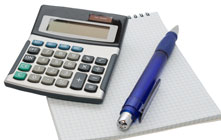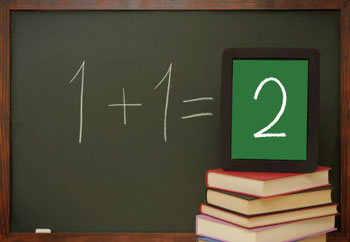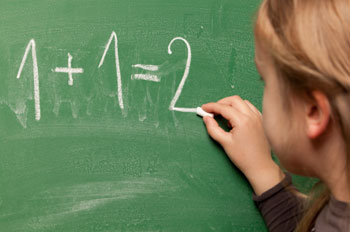Children's Math Dictionary: Math Terms Defined for Kids
Although there are a number of published math dictionaries that your child could use as a resource, he or she might benefit more from creating his or her own dictionary. Read on for some tips on building a personal math dictionary, as well as some sample vocabulary words for elementary math students.

How To Create a Math Dictionary
Although vocabulary instruction isn't often associated with math, learning math terms can aid in communication between students and teachers. For example, if your child doesn't know the meaning of divisor, dividend and quotient, his or her teacher might find it difficult to teach division. A store-bought math dictionary can help your child learn and understand math terms; however, creating his or her own resource might better ensure that the concepts and definitions are stored in your child's long-term memory.
To help your child create a math dictionary, have her save a few pages in the back of her math notebook where she can write down terms that she comes across during class time or in her textbook. Encourage her to write definitions in her own words, rather than copying them from the textbook. Also, have her draw a picture or include an example since it may be easier for your child to understand a concept by seeing it, rather than reading about it.
Additionally, instead of listing math terms alphabetically, have your child group them by concept. For instance, the terms 'numerator' and 'denominator' wouldn't be next to each other in a typical dictionary, but it makes sense for them to be grouped together in a math dictionary since they both relate to fractions.
Common Elementary Math Terms
Numbers
- Even numbers
- Numbers that can be divided by two. For instance, two, four, six and eight are even numbers.
- Odd numbers
- Numbers that can't be divided by two. You might have your child think of odd numbers as the opposite of even numbers. Examples are one, three, five, seven and nine.
Fractions
- Numerator
- The number that's on the top of a fraction. For instance, in the fraction 2/4, two is the numerator. It indicates parts of the whole.
- Denominator
- The number on the bottom of a fraction. For instance, in the fraction 2/4, four is the denominator. It indicates the whole that the parts are divided into.
Angles
- Acute angle
- An angle that measures less than 90 degrees. Your child might remember this term by thinking of it as 'a cute angle' because it's small.
- Right angle
- An angle that measures exactly 90 degrees.
- Obtuse angle
- An angle larger than 90 degrees. Your child can think of it as the opposite of an acute angle.
Other Articles You May Be Interested In
-
MIND Games Lead to Math Gains

Imagine a math teaching tool so effective that it need only be employed twice per week for less than an hour to result in huge proficiency gains. Impossible, you say? Not so...and MIND Research Institute has the virtual penguin to prove it.
-
Should Math Be a Main Focus in Kindergarten?

Should kindergartners put away the building blocks and open the math books? According to recent research, earlier is better when it comes to learning mathematical concepts. But that could put undue pressure on kids, parents and even teachers.
We Found 7 Tutors You Might Be Interested In
Huntington Learning

- What Huntington Learning offers:
- Online and in-center tutoring
- One on one tutoring
- Every Huntington tutor is certified and trained extensively on the most effective teaching methods
K12

- What K12 offers:
- Online tutoring
- Has a strong and effective partnership with public and private schools
- AdvancED-accredited corporation meeting the highest standards of educational management
Kaplan Kids

- What Kaplan Kids offers:
- Online tutoring
- Customized learning plans
- Real-Time Progress Reports track your child's progress
Kumon

- What Kumon offers:
- In-center tutoring
- Individualized programs for your child
- Helps your child develop the skills and study habits needed to improve their academic performance
Sylvan Learning

- What Sylvan Learning offers:
- Online and in-center tutoring
- Sylvan tutors are certified teachers who provide personalized instruction
- Regular assessment and progress reports
Tutor Doctor

- What Tutor Doctor offers:
- In-Home tutoring
- One on one attention by the tutor
- Develops personlized programs by working with your child's existing homework
TutorVista

- What TutorVista offers:
- Online tutoring
- Student works one-on-one with a professional tutor
- Using the virtual whiteboard workspace to share problems, solutions and explanations